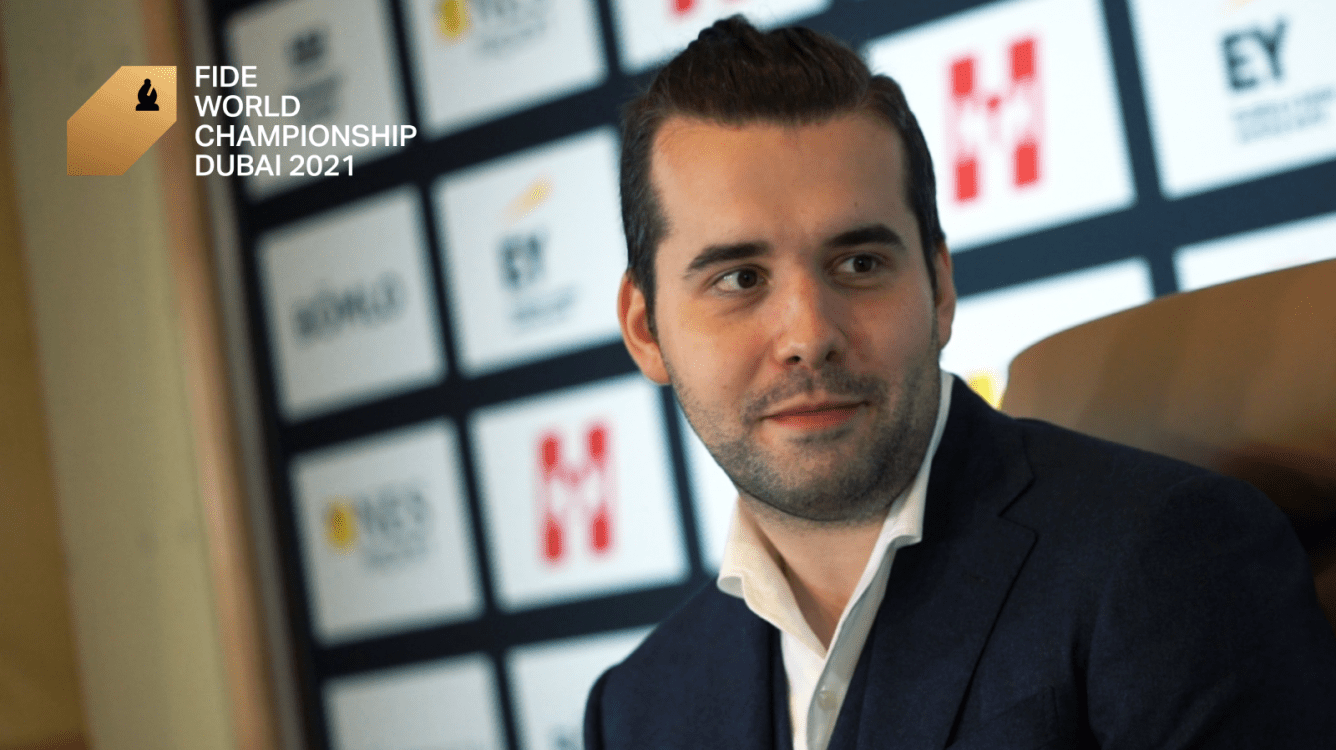
Know The Challenger: Ian Nepomniachtchi
It is amazing how all contemporary world champions were born somewhere on the outskirts of the giant empire rather than in its greatest cities and chess centers, such as Moscow or Leningrad. GM Anatoly Karpov was born in Zlatoust, Chelyabinsk oblast, in the Ural region. Baku, the capital of Azerbaijan, the native city of GM Garry Kasparov, had only a few strong players in its youth. GM Vladimir Kramnik was born in Tuapse, a resort town not too far from Simferopol, the home city of GM Sergey Karjakin, 2016 World Championship Candidate.
GM Ian Nepomniachtchi (a.k.a. "Nepo") follows that trend, maybe caused by the fact that chess is very popular in every corner of former Soviet countries. He was born on July 14, 1990, in Bryansk, an old city of 400,000 inhabitants located 350 kilometers from Moscow.
- The Beginning
- Youth Championships
- Meeting Magnus
- Next Stage
- Early Openings
- Big Year
- Distractions
- Continued Development
- New Firsts
- Inconsistencies
- World Cup Struggles
- Candidate and Challenger
- The Match
The Beginning
30 years ago, сhess was on the rise in Bryansk. Evgeny Gleizerov became the first local GM, and the famous coach IM Valery Zilberstein moved there from Novosibirsk. These crops soon gave fruit—a prodigy with bright and clever eyes and an uncanny erudition. It did not come as a surprise: Nepomniachtchi's grandfather was a regionally famous educator and a lyrical poet. Ian learned the rules of chess before he was five, and at the age of seven, he earned some early triumphs.
Ian was lucky to be tutored by FM Valentin Ekimenko, who was fascinated with his student. He accompanied Ian to various tournaments and spent almost all available time with him. The boy's progress was steady: first category, candidate master, first wins against master-level players, and so on.
The 2021 World Championship Challenger, Ian Nepomniachtchi, pictured with the 12th World #Chess Champion, Anatoly Karpov.
— Douglas Griffin (@dgriffinchess) April 26, 2021
(Photo via https://t.co/DG2ShlDgjx.) pic.twitter.com/2pF3y2rF41
Ekimenko soon realized that the rising star needed a better coach and handed him over to Valery Zilberstein, who passed away in 2005, but was coaching Ian during his formative years. The grateful student annually holds the Zilberstein Memorial tournament in Bryansk. Its first seasons were organized on a moderate scale, as Nepomniachtchi provided the prize fund himself, but the latest edition was supported by the regional government. Thus, the 2021 Zilberstein Memorial became one of the strongest events in the national chess schedule. But let's get back to Nepo's youth.
Ver essa foto no Instagram
Youth Championships
Nepomniachtchi soon became the European and World Youth Champion, despite exceptionally strong competitors also born in 1989-1991. Only Karjakin blossomed very early and preferred adult tournaments, bypassing youth competitions. The rest of the best was awesome: Magnus Carlsen, Maxime Vachier-Lagrave, Dmitry Andreikin, Wang Hao, Le Quang Liem, and Sergey Zhigalko, all eventually became strong GMs. Ian's friend GM Ildar Khairullin also was a very promising talent at the time.
At the national level, Ian was tutored by the Russian youth team coach GM Sergey Janovsky, who had the invaluable and rare skill of finding sponsors. Ian says that Janovsky was not only his coach but also his friend. Janovsky still supports his favorite student as the head coach of Russian teams.
Meeting Magnus
Nepomniachtchi and Carlsen first met in 2002 in round five of the U-12 European Championship in Peniscola, Spain. Nepomniachtchi was a favorite rated 2344 (only Vachier-Lagrave's 2359 rating was higher; Khairullin's was 2339; Andreikin's was 2332), while the Norwegian boy was an obvious underdog: only 2250. Carlsen surprised his opponent with the Alekhine Defense. His position was better, but he got off track and Ian did not miss that chance. In the final standings, Nepomniachtchi and Carlsen shared first, scoring nine points each, but the tiebreaker was in Ian's favor.
Next year they played a decisive game in Khalkidhiki, Greece, in the final round of the U-14 World Championship. The winner would become the champion, while the loser would not get a medal. By that time Carlsen was rated 2450—already a bit more than Nepomniachtchi's 2447—and played more aggressively. Carlsen sacrificed a pawn to get the initiative, kept the fire burning with one exchange, and then another. Yet, Nepomniachtchi managed to keep his head cool, refuted the attack, and ended up winning.
At the time, Nepomniachtchi was often mentioned in the Russian press and considered the brightest chess star of his generation. Janovsky found top coaches for Ian's training sessions. The young man learned a lot from the famous IM Mark Dvoretsky, the explorer of the deepest endgame labyrinths, and GM Sergey Shipov, Kasparov's sparring partner. Ian still uses Shipov's signature recipes, such as the Grunfeld or French Defenses, as well as other combative openings.
Next Stage
Nepomniachtchi almost won the U-18 Russian Championship at the age of 12 (only Kasparov and GM Gata Kamsky could boast a similar achievement in Soviet chess)! In the last round, he ferociously attacked the tournament leader GM Igor Kurnosov (in 2013, he died tragically in a traffic accident). Kurnosov was low on time, but Ian blundered the queen exchange and could not stop his opponent's nimble pawn. The boy burst into tears and knocked pieces down: he was very emotional about that failure, although it was only a small hiccup in his sky-rocketing trajectory.
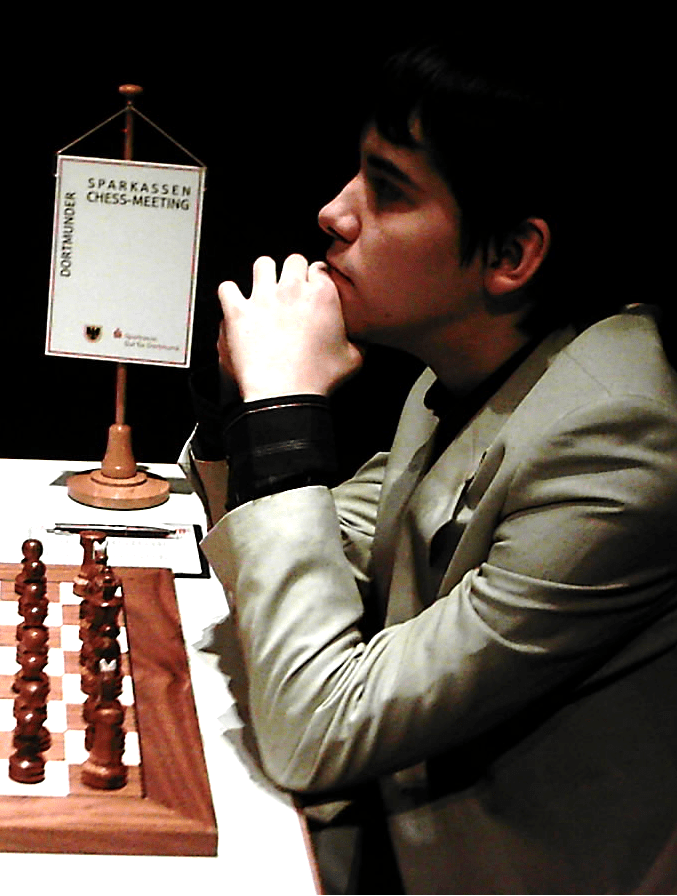
Ian annually played in World's Youth Stars tournaments held in Kirishi and won the first (in 2003) and the fifth (in 2007) editions of the strong event (only Carlsen could not participate because of his school schedule). In 2004, Nepo played in the Russian Championship Higher League for the first time and evened his score against Kurnosov.
Yours truly first met Nepomniachtchi online. The young player ranked high on the leaderboards of Chessplanet and PlayChess. These early chess sites do not stand the comparison with modern Chess.com by the numbers of their audience, the scale of their events, or the diversity of their features. But back then, many players spent their days and nights there.
Early Openings
I vividly remember how we were chatting on Chessplanet and Ian showed me a trap he learned from Igor Zaitsev, one of Karpov's coaches. Yes, the chief scientist of the world champion's opening laboratory also trained Nepo.
Not all of Nepomniachtchi's openings schemes stood the test of engines, but he had a very creative and distinctive approach. For example, I've always been amazed at his treatment of French Defense:
Then, the white rook moved to h3 and all of a sudden Nepomniachtchi started a powerful attack! He played many off-beat games in this variation and later defeated GM Ding Liren twice (in rapid games).
Big Year
In 2006, I met Nepomniachtchi in person at the Moscow Open. His demeanor was incredible—he seemed to know all and he did not spend any time thinking. Akin to a young GM Viswanathan Anand, he did not use in full even the increment and usually accumulated more than two hours by the end of the game, while his opponent had to suffer through time pressure twice. However, that tournament was not a success for him. Nepomniachtchi could not find a brilliant queen sacrifice in the game against Evgeny Najer and thus could not get a prize spot.

In 2006, the young player confidently played in the Russian Championship Higher League, defeated GMs Pavel Smirnov and Mikhail Kobalia at the end of the event, and qualified for the Russian Championship Superfinal! In the Superfinal he won three games and lost four, proving himself as a creative and fighting player. In the last round, he played for more than 100 moves against GM Evgeny Alekseev, who eventually became the champion. Nepomniachtchi tried to win an obviously drawn pawnless endgame with a bishop and a knight versus a knight. This says a lot about his vigor and determination. Nepomniachtchi plays to win with any color and one does not find many short insipid draws among his games.
In his youth, GM Alexander Khasin, the captain of the Tomsk-400 chess team, had been a student of Nepomniachtchi's coach Zilberstein. Thus, in 2006 he was invited to play on a reserve board alongside GMs Levon Aronian, Alexander Morozevich, Dmitry Jakovenko, Victor Bologan, and Vladislav Tkachiev. This stellar squad took bronze at the Russian team championship and gold at the European Club Cup. At the latter tournament, Nepomniachtchi scored 4/4—a great display of his ability to win for the team. Later he played for various clubs from Moscow, Saratov, Novosibirsk, Cheboksary, and Yekaterinburg as a team leader showing his resilience in decisive matches.
In 2007, Nepo took second at the Tata Steel tournament, after the experienced GM Michal Krasenkow, but ahead of GMs Emanuel Berg, Parimarjan Negi, Hou Yifan, and other strong players. That year he became a GM and a 2600+ player. Not bad at all, but Carlsen was already playing in elite tournaments.
Nepo qualified for his first elite tournament by taking first place at the Aeroflot Open in 2008. Remember that each year the Aeroflot Open winner automatically got an invitation to the Dortmund Sparkassen tournament.
Nepo started with 3/3, defeated GM Aleksey Dreev, and finished as the sole winner with 7/9. In the last decisive round, he beat GM Le Quang Liem. The winner was a genius over the chessboard and a prank-loving young boy in life. I saw with my eyes at the hotel how Khairullin and Nepo purposely inserted the highest-valued money cedules they had with them into the vending machine vending to produce a spray of coins erupting from the change slot while the boys were laughing and shouting "jackpot!"
Dortmund was Nepomniachtchi's first chance to cross swords with several of the global chess elite: GMs Kramnik, Shakhriyar Mamedyarov, Vassily Ivanchuk, and Peter Leko! Ian did not lose a single game, defeated GM Loek van Wely and shared second.
Distractions
Now you, dear reader, can ask the obvious question: why, despite such great success, the talented Russian GM was not under the spotlight for some years? Why did he become a top player much later than Carlsen, whom he defeated so often in youth tournaments? I guess that the reason was Ian's fascination with computer gaming. That digital onslaught on humankind was unstoppable at the time.
I remember well the Russian Championship Higher League, organized in Novokuznetsk by IM Maxim Ivakhin in 2008. The accommodation and catering were very good, but there was no Wi-Fi in the rooms, although the players could use some workstations in the hotel's computer club for free.
Nepomniachtchi was not simply a frequent visitor of that club—he spent all his time there playing Dota 2, except for when he was playing tournament games and doing some preparation. Okay, we were in a grim Siberian town and there were hardly any other means of civilized entertainment. Also, I did not know that Nepomniachtchi, a.k.a. FrostNova, was among the most famous Russian Dota players and a member of the TR cybersport team, which would soon win the prestigious ASUS Cup Winter event.

Ian nonetheless started 3.5/4 and it seemed that he could easily qualify for the Superfinal, but he got exhausted by the end of the tournament and finished with a 50% score. Did Dota damage his chess? It is hard to judge, but it definitely did not help.
Continued Development
Unhappy with that result, Ian went to Serpukhov to play in the Russian Cup. He successfully passed the three first rounds but lost in the quarterfinal to GM Nikita Vitiugov. The next year, 2009, brought Nepo mixed emotions. He reached the finals of the Russian Cup but lost to GM Evgeny Bareev.
It was not a bright period of Ian's career, but it was the start of his work with the strong GM, European champion, erudite theoretician, and empathic friend Vladimir Potkin. Their duo was invincible at Aeroflot 2008, but in 2010 their achievements rose to the next level. Nepomniachtchi became the European Champion in Rijeka, Croatia. He scored an impressive 9/11 and finished with wins against GM Baadur Jobava and GM Vladimir Akopian.
Nepomniachtchi came to Irkutsk to play in the Russian Championship Higher League in 2010 as a 2700+ player and took clear first without any competition. He made his debut for Russia at the Olympiad in Khanty-Mansiysk on the first board of the second youth team. (Earlier he played for Russia only in annual matches against China and other friendly competitions). He won the individual bronze on the first board, but his team could not win a medal, because its performance was affected by the lost match against France with the participation of GM Sebastian Feller, who was later disqualified for cheating in that tournament.
New Firsts
In autumn 2010, Nepomniachtchi moved to Moscow and entered the Russian State Social University (RSSU), where he later got a degree with honors. At the end of the year, he won his first Russian Championship Superfinal by defeating Karjakin, another RSSU student, in tiebreaks.
In 2011 Nepomniachtchi could boast an impressive 2733 Elo rating. He was invited to the Tata Steel tournament, where he could challenge the former world champions Anand and Kramnik, the world's number-one ranked Carlsen, as well as Aronian, Vachier-Lagrave, Hikaru Nakamura, Anish Giri, and other stars. Nepomniachtchi scored 6/13, but he proved again to be a difficult opponent for Carlsen, whom he defeated with Black. In the interview for "64—Chess Review" (the leading Russian chess magazine), he attributed his success to Potkin, who had predicted the opening as a clairvoyant. But it was Nepomniachtchi himself who played energetically in the critical moment.
Inconsistencies
That was the start of his long journey to the top ranks of the global chess elite. The fans supported Nepomniachtchi as a maximalist and a chess gladiator who always gave a good fight, but he came back on the shield almost as often as with the shield. In a good shape, he could beat records and decimate the top players, but his rating went up and down as a harmonic curve. It was so frustrating that its downward segments often coincided with world championship qualifier events.
As a Russian team player, Nepomniachtchi won the European and the World Team Championships and two bronze Olympic medals (in 2016 and 2018). Sometimes, the national squad was even criticized for its "Nepo's penalty kick" team tactics: players on the other three boards did not mind drawing, while Nepomniachtchi tried to win with White and usually did it, especially when he was in a good shape.
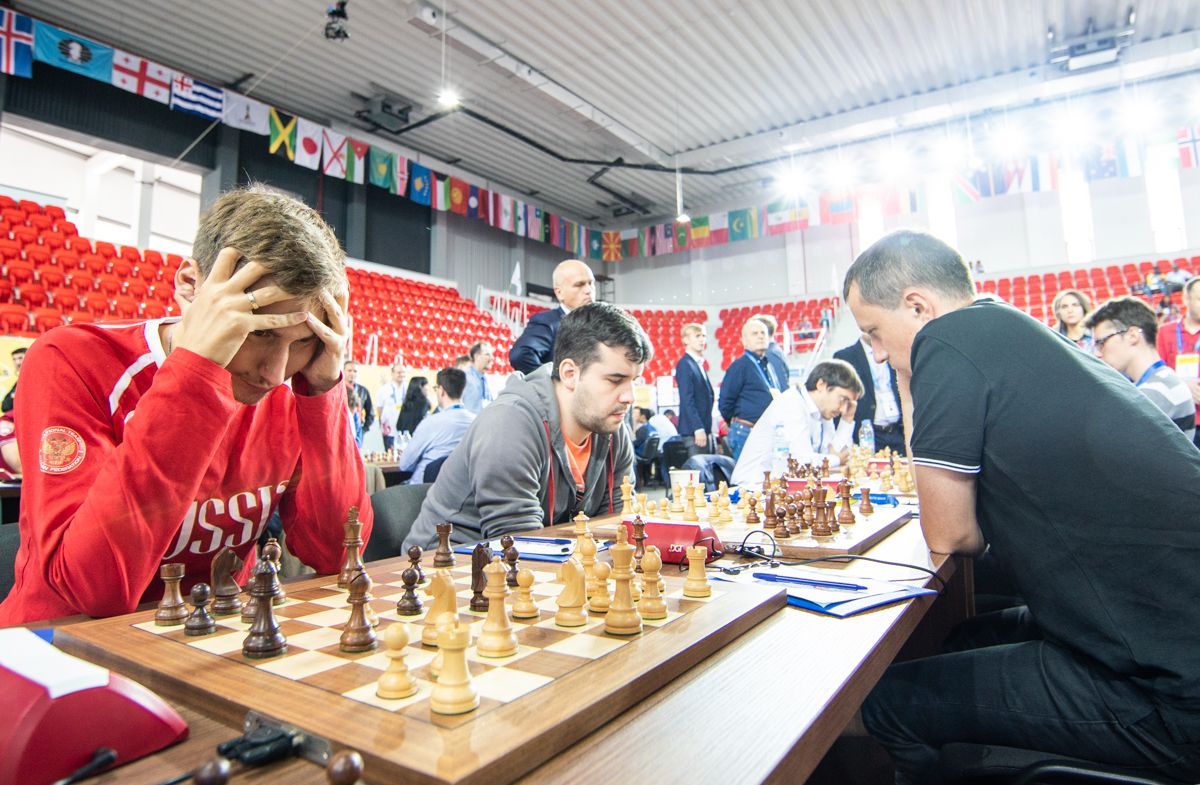
At the time, there was a "zero tolerance" rule, meaning that a player forfeited his game if he was late, even by a second. Once at the World Team Championship, Nepomniachtchi almost slept his game away. He was dressing in the elevator, rushed into the tournament hall, and arrived just in time to make a move with only a few seconds left before the deadline. Still, Nepomniachtchi swept his opponent off the board.
In 2013, Nepomniachtchi shared first place at the European Championship and the Russian Higher League, played well at the World Rapid and Blitz Championship, and shared first with GM Peter Svidler at the Russian Championship Superfinal (although he lost in the tiebreaks).
World Cup Struggles
However, the most important event was a disaster for him. In the first round of the 2013 World Cup, Nepomniachtchi lost 0.5-1.5 to GM Wei Yi, at the time a relatively unknown Chinese youngster rated only 2551. Andreikin, Ian's rival in youth championships, reached the final versus Kramnik and qualified for the Candidates Tournament. Carlsen, that guy from Norway beaten by Ian in childhood, took the World Championship from Anand.
In 2014 Nepomniachtchi was runner-up in the World Blitz Championship. In 2015 he won the Aeroflot Open and had a relatively better start at the World Cup 2015. Nepomniachtchi reached the third round to battle Nakamura all the way to the armageddon tiebreak. The whole world watched as Nakamura castled by moving his rook before his king and later won the game. Nepomniachtchi submitted a claim, but the appealing committee presided by the Head of the European Chess Union GM Zurab Azmaiparashvili rejected his protest. The Russian player looked like Sisyphus, forced to roll a boulder all the way to the top again. That World Cup in Baku was taken by another of Ian's peers, Karjakin, who later qualified for the match against Carlsen.
Azmaiparashvili, who took a move back in a classical game, is now a member of an appeals committee. Feel the irony.
— Yan Nepomniachtchi (@lachesisq) September 20, 2015
2016 was a good year for Nepomniachtchi who took first at the Hainan Danzhou tournament and the Tal Memorial in Moscow. In 2017, Nepomniachtchi resumed his quest for the Candidates Tournament, now participating both in the World Cup and FIDE Grand Prix series.
He played well in the Sharjah and Geneve legs of the Grand Prix, but a weak performance in Moscow downed him to ninth place in the final standings. His participation at the World Cup, now held in Tbilisi, ended again in round three. He blundered a rook to Jobava in the tiebreaks and resigned after its capture. Such misfortunes could ruin the confidence and motivation of any athlete, but Nepomniachtchi was preparing for another ascent.
Meanwhile, Nepomniachtchi remained the bete noire of the world champion. He scored his fourth win against Carlsen at London Chess Classic in 2017. This time the Norwegian was very cooperative. In an equal position, he sacrificed a pawn for the initiative and later blundered a piece. It was not until the 2019 Grand Chess Tour Croatia when Carlsen finally obtained his first (and to date only) classical win versus Nepomniachtchi.
Nepomniachtchi loses to @MagnusCarlsen, but @lachesisq sneakily puts the kings on white squares to register a white win 😂#TSChessIndia #GrandChessTourhttps://t.co/nVLjkIlNqs pic.twitter.com/cU0pCjt900
— Grand Chess Tour (@GrandChessTour) November 25, 2019
Before his new championship campaign in summer 2018, Nepomniachtchi won the Gideon Japhet Memorial in Jerusalem and the Dortmund Sparkassen tournament, while Kramnik, who had won that event ten times, stayed behind. That was a remarkable change of generations. Soon after, the 14th world champion ended his professional career, leaving Nepomniachtchi the spot of Russian chess leader.
Took the 1st place in Dortmund @SparkassenChess. Not without a bit of luck, however, but nevertheless I am very happy & satisfied. #chess #dochess #шахматы
— Yan Nepomniachtchi (@lachesisq) July 22, 2018
The 2019 World Cup confirmed that knockout formats did not suit him well. He was rated 2776, got a passable bracket, won three rounds without much trouble, but stumbled against GM Yu Yangyi in the round of 16.
Another qualification path was more successful for Ian, even though it was a knockout again. Nepomniachtchi won two FIDE Grand Prix legs, in Moscow and Jerusalem, and earned the much-needed invitation to the Candidates Tournament! That event would be remembered among the most unusual in chess history.
Candidate and Challenger
The Candidates Tournament started in March 2020 in Yekaterinburg. However, its second half was postponed because of the COVID-19 pandemic. In the first half, Nepomniachtchi scored 4.5/7, sharing first with Vachier-Lagrave, who defeated the Russian candidate in round 7.
The pause lasted for more than a year. As the world was looking for a cure or at least a vaccine to stop the disease, the candidates tried to keep their chess shape. GM Wang Hao was not up for that task, lost many games in the second half, and claimed that his chess career was over! Brilliant players such as Vachier-Lagrave, Caruana, and Ding also did not play at their best. But now we've gotten a little ahead of the story.
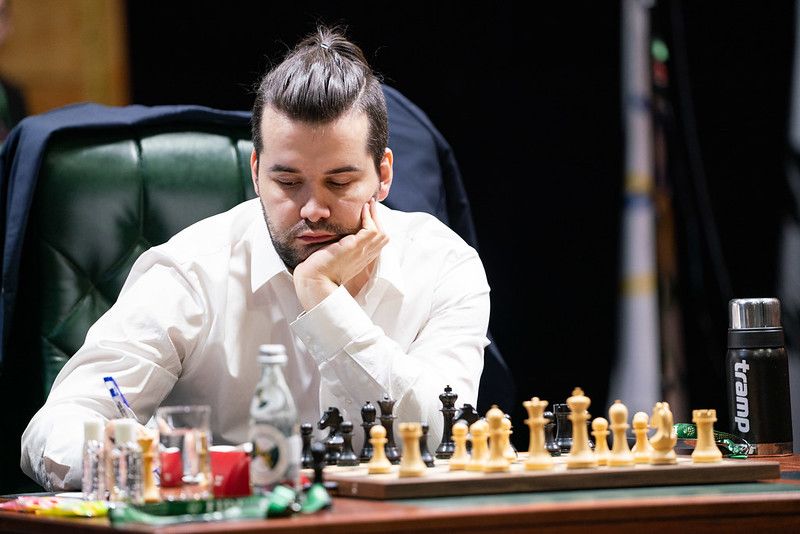
During the lockdown, Nepomniachtchi played in many online tournaments and won gold together with the Russian team at the first FIDE Online Olympiad played on Chess.com. In the Champions Chess Tour, he sometimes defeated the world champion, although the aggregate score was in Carlsen's favor. In an interview, Nepomniachtchi said that he set himself a specific task in these online tournaments: to stop moving before thinking. That hastiness had cost him very dearly in the past.
Nepomniachtchi revealed his love not only for chess but also for "What? Where? When?," an intellectual game show that is extremely popular in Russia. He played it in the open format and recently participated on the TV show, and also hosted a series of chess-themed games on the Russian Chess.com Youtube channel together with GM Aleksandra Kosteniuk and GM Evgeny Tomashevsky,
At the end of 2020, Nepomniachtchi won the Russian Championship Superfinal, his only over-the-board tournament during the year-long Candidates pause, becoming the national champion for the second time in his career and showing that he is ready for serious challenges.

The Match
The Candidates Tournament finally resumed in April 2021. Nepomniachtchi won the tournament with a round to spare and earned the right to challenge Carlsen for the world championship in November 2021.
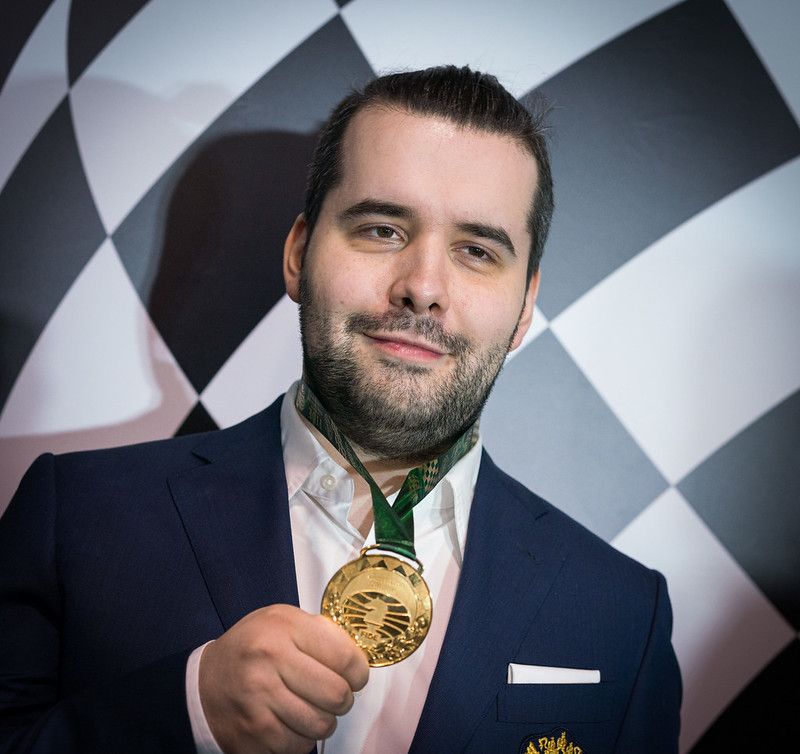
Has it happened before in chess history that a player considered perhaps the champion's most dangerous rival finally challenged him after previously missed opportunities? There are a couple of examples: GM Boris Spassky, the greatest Soviet prodigy, who would take on GM Tigran Petrosian twice after several failed attempts—a fact that might have gotten in Spassky's way of matching his peer GM Mikhail Tal's feat of becoming a young world champion. Or Kramnik, who played his match versus Kasparov under the auspices and at the whim of Caissa the all-mighty; Anand and Kamsky, the other stars of that generation, had gotten the experience of championship matches much earlier. But it was Kramnik, who had lost repeatedly at earlier stages, who finally toppled Kasparov.
Fortune herself guided the chess world toward the Carlsen-Nepomniachtchi FIDE Championship Match, and finally, it is about to start!




